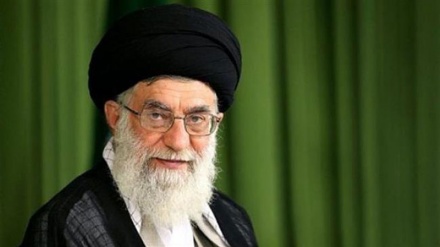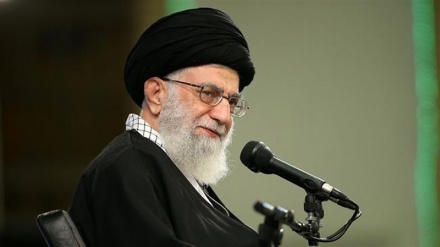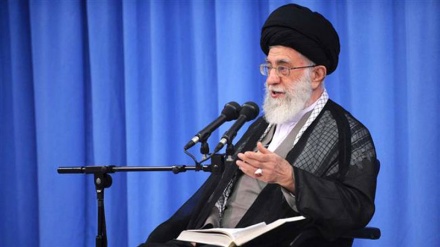In Presence of the Sun (87)
This episode will touch upon Ayatollah Khamenei’s views about Hajj pilgrimage.
Leader of the Islamic Revolution Ayatollah Seyyed Ali Khamenei says, “Through centuries and long years the Islamic Ummah has been paralyzed, made abject, made indolent and desperate; and it was intended, through modern tools, to undermine spirituality, attention and humbleness to God among the Islamic Ummah. Hajj repairs all these ailments; dignifies the Islamic Ummah, gives it the feeling of might and grants it hope. Hajj is just like this.”
Unity is one of the most important issues of the Islamic world especially in the current era. The unity of Islamic Ummah has many enemies due to its importance. The archenemy of unity is Imperialism or Global Arrogance as it was rightly called by Imam Khomeini according to the teachings of Qur’an. The embodiment of the Global Arrogance is the regime of the United States of America. Ayatollah Khamenei believes that the enemies of unity in the Islamic Ummah, which are indeed the enemies of genuine Islam, spend colossal sums of money and prepare long term programs to smear the image of Islam and stir up internal rifts and divisions among Muslims. He stresses that Muslims should close their ranks to preserve their solidarity and they must help each other. He says, “The Islamic governments can contribute and play a role to use the capacities of Islamic nations to create the great unity.”
It is a matter of great regret that unity has not materialized among Muslims. In view of the Leader most of the factors that hinder unity stem from misunderstandings and misinformation. Unawareness of each other’s condition, holding illusive and false ideas about other sects’ beliefs are some of these factors. Ayatollah Khamenei says, “Shia about Sunni, Sunni about Shia, certain Muslim nation about another nation or its neighbor, they indulge in miscomprehension. The enemies, too, intensively foment these miscomprehensions. Moreover, some individuals, affected by this misunderstanding, misanalysis, not seeing the enemy’s general scheme become the plaything in the hand of the enemy and the enemy exploits them. Sometimes, a very trivial motive urges one to say something, take a stance, do something which the enemy uses that trivial word in its general scheme and widens the rift among brothers.”
According to the Leader having differences of opinion is a natural thing among the believers of two sects. It is not restricted to Shias and Sunnis. This adherence to one’s belief has always existed among various Shia and Sunni sects. A glance at history shows that there have been differences of opinion among the Sunni jurisprudential sects like Ash’arites and Mu’tazilites or the Hanbalis, Shafeis, Hanafis and so on. This has been the case among Shia sects, too. Ayatollah Khamenei stresses, “When these differences of opinion come to the lower levels – the ordinary people – they reach severe and dangerous places; they grapple with each other; while the ulema sit and talk together and debate. But if it is the turn of those who don’t have scientific weapon, they use the weapon of sentiments, punch and material weapon which is dangerous. This has always existed in the world and the faithful and good-wishers would always try to prevent it. The Ulema and eminent figures have endeavoured not to let their nonscientific work reach the level of clash. Yet, from a certain era onwards another factor entered the scene and that was ‘colonialism’. We don’t want to say that the differences of Shia and Sunni have always been caused by colonialism. Sentiments have been involved, too. Some instances of ignorance, some prejudices, some sentiments, and some wayward understandings have also been involved. However, when colonialism entered it made maximum use of this weapon.”
Muslims should be vigilant that the enemy infiltrates from our smallest misunderstanding and ignites the fire of sedition. That’s why Ayatollah Khamenei focuses on the Islamic unity as the core of interaction among Islamic denominations and maintains that untying the knots that cause rifts and animosity is of paramount importance in the current era. He states, “The vicious hands of the colonial policies have put on their agenda to create discord in a bid to secure their sinister goals; but today that, thanks to the Islamic Awakening, Muslim nations have properly recognized the enmity of the Front of Arrogance and Zionism and adopted stance against it, the seditionist policies have been escalated among Muslims. The deceitful enemy is hell-bent on igniting the fire of domestic wars in the midst of Muslims, deviate the motives of resistance and struggle among them in a bid to place the Zionist regime and the elements of the Arrogance, which are the real enemies, in the safe margin. Staging of Takfiri terrorist groups and the like in West Asia originates in this sly policy. This is warning to all of us that consider ‘Unity of Muslims’ on top of our national and international duties.”
The Leader describes Hajj as the symbol of unity, solidarity and the fulcrum of brotherhood and cooperation. He believes that the reality of unity has its roots in the jewel of monotheism and it is quite feasible to achieve unity in the light of sincere servitude of God. He stresses that in the Hajj season everybody should learn the lesson of concentrating on commonalities and removal of differences.
In view of Ayatollah Khamenei the Abrahamic Hajj is the Mohammedan Hajj in which marching toward monotheism and unity is the spirit and priority of every ritual and motto. Furthermore, the Symbolic House of God, Ka’aba, is the token of monotheism and the mystery of unity and emblem of Islamic brotherhood and equality. The Leader of the Islamic Revolution likens Hajj to a fresh waterfall which benefits the pilgrims the two realities of monotheism and unity simultaneously.
Ayatollah Khamenei believes the great lesson of Hajj is like a touchstone for Muslims to gauge themselves to see how much they have been honest in reaching monotheism and how unadulterated their efforts have been. Detaching from polytheism and impurity in belief and deed is the true monotheism and God has shown this sweet experience as the great lesson for the Islamic Ummah.
The Leader of the Islamic Revolution is of the opinion that Hajj is not a personal act of worship but it is intermingled with the issues of Muslims and the woes gripping the Islamic nations. Thus, denunciation of the ungodly rulers of any era is in full conformity with the spirit of Hajj. Therefore, a Hajj pilgrim cannot be heedless of the issues of the Islamic nations while he is engaged in self-purification. These are the two dimensions of a single move. This has been properly stated by the Leader, “Reformation of one’s self and reformation of the Ummah are the two unclosable obligations that materialize in Hajj.”
Another important aspect of Hajj underlined by Ayatollah Khamenei is the potential to foil the enemies’ plots. He says, “The first impact of Hajj is inside the Islamic Ummah, in our hearts. On the one hand it has an international impact; it weakens the enemy, crushes the enemy’s morale and shows off the grandeur of Islam to the enemy and displays the unity of the Islamic Ummah in face of the enemy.”
The Leader describes Hajj as the real symbol of closeness of hearts and tongues as in the beautiful worship of Hajj people with different colours of skin, nationalities, sects, tastes, etc. all come together and circumambulate the Ka’aba and call the One and Only God and disavow polytheism and unfaith in all their representations. Together they turn round the Ka’aba, together they perform Sa’y, and together they sojourn at Arafaat and Mash’ar and so on. The Islamic cooperation and uniformity is displayed to the world during Hajj. This puts the enemies in a state of passiveness.
Ayatollah Khamenei elaborates, “May God damn those who tried to make distant the reality of the Islamic Ummah and the importance of the Islamic Ummah from the minds. They tried to divide Muslims into diverse motives, aggrandize nationalities before the grandeur of the Islamic Ummah and separate nations from each other; while the Islamic Ummah is important. Grandeur belongs to the Islamic Ummah. Almighty God sends down His mercy upon the Islamic Ummah. Hajj symbolizes the formation of the Islamic Ummah. Muslims converge from everywhere and from remote routes. What a great chance to speak together, to bring their hearts close, to hear their pains, to express sympathy. Where will this take place except in Hajj? One of the social aspects of Hajj is the issue of unity.”
RM/ME


